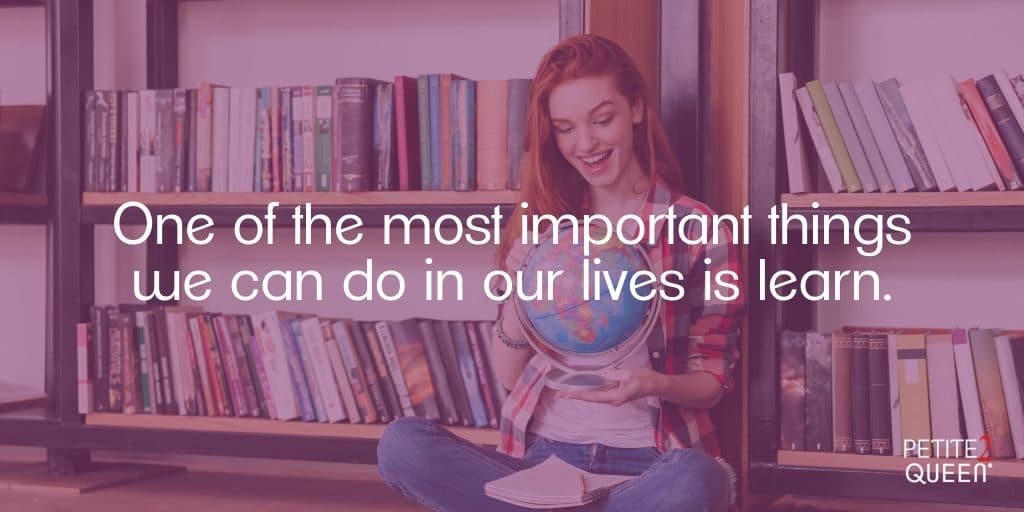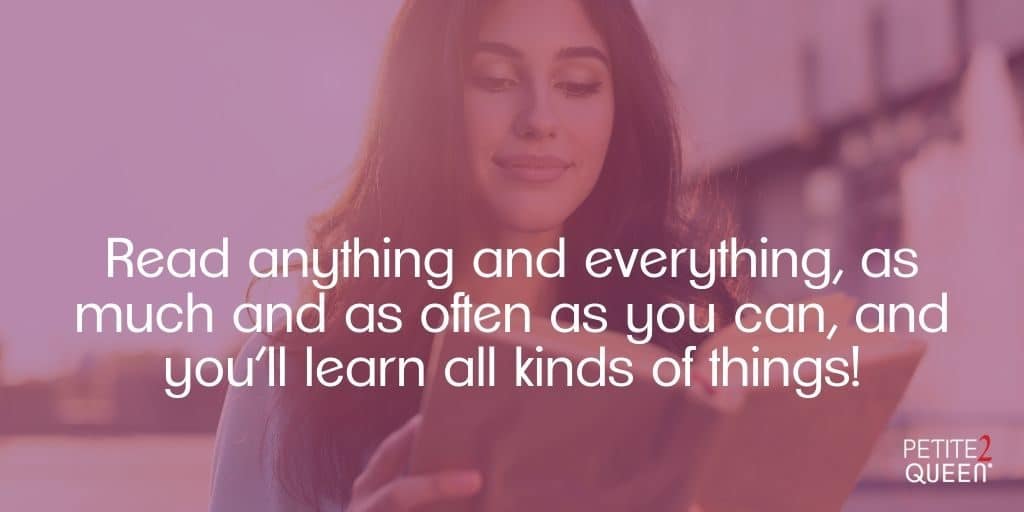When I finished college, graduation was a bittersweet ceremony. I was ecstatic to finally have earned my degree, yet I was sad that my years of learning were over. Luckily, it didn’t take long for me to realize I could continue my education – if in a looser, more informal way!
One of the most important things we can do in our lives is learn. Even if you hated school or got anxiety each time there was an exam, we all like to learn. It’s human nature to be curious. Just because school is over doesn’t mean you know everything and can stop learning now. Quite the contrary: School just gave you some helpful info and the tools to continue pursuing knowledge for the rest of your life.
That’s a tall order, and with a world of options and opportunities available, it may be hard to decide where to start. Let’s break it down.
What to Learn
Step One: What should you learn? Or rather, what do you want to learn? The answer is: anything you want! Too endless? Start with what interests you. What have you always wanted to know how to do, or simply know more about? Anything that sparks your interest is worth pursuing. You may want to play an instrument, speak another language, hone your artistic skills, become a master coder, improve your math, cook better meals, learn about animals in the Amazon rain forest. The list goes on.
You may want to learn something to directly benefit your life. Perhaps your in-laws speak Spanish and you’d like to be able to communicate with them. Perhaps your career would really benefit from improved public speaking, or an updated understanding of social media marketing.

On the other hand, your pursuit of knowledge doesn’t need to help you meet an end goal. It could simply be because you have an interest in this subject or skill. That’s perfectly okay. Because unlike high school, where there are certain subjects we’re required to learn, our adult education affords us much more flexibility to choose our “courses.” They can all be electives now. Doesn’t that sound like fun?
You may want to build upon a skill you already started before. Maybe you want to pick up where your childhood piano lessons left off. Perhaps you want to dive deeper into the literary world than your English classes went when you were a teenager. On the other hand, you may want to start learning about something completely new that you know nothing about. Either way is fine, as long as you’re excited about pursuing this knowledge.
How to Learn
Now that you’ve determined what you want to learn, the next step is to figure out how to learn it. We all learn best in different ways, and depending on your lifestyle and goals, certain methods may work better for you than others. Try out any of these and see where it takes you:
Reading. Ah, yes, good old-fashioned reading. Depending on what you want to know, you can read any number of materials: Books, magazines, online articles, newspapers. Nonfiction may seem like the obvious choice, but there’s a lot you can glean from works of fiction, too. For example, I love to read historical fiction novels. They tend to be well-researched, and they immerse me in a realistic world that happens to be semi-educational, too. Thanks to these novels, I now remember when and where the plague first hit Europe. I now better understand the intricacies of WWII. I even understand a lot more about mid-20th century China than I ever did before. Read anything and everything, as much and as often as you can, and you’ll learn all kinds of things. It may even be fun for you. Pro tip: You can listen to audio books, too! Have a long commute each day? Pop in an audio book and enjoy the adventures as you navigate rush hour traffic.
Watch videos and films. If you’re seeking a specific skill – like website coding, or making the perfect angel food cake – there are plenty of tutorials and training videos available on YouTube, Lynda, and more. I myself learned how to cut my husband’s hair by watching a handy video tutorial. You can also check out the multitude of documentaries available on any number of subjects. Watch documentaries on ancient Egypt, cats, the history of the printing industry, you name it. You can even gain some understanding from certain feature films, depending on the topic and plot. There’s a lot you can learn from simply sitting back and watching a good video.

Get a learning app. When you’re on the go and just want some tidbits of info here and there, a good app can be your biggest aid. There are plenty of apps that can help you learn a language or improve your math skills. My newest quest is to increase my vocabulary. I recently downloaded a word-a-day app that teaches me one new word each day. I then try to use that word in sentences throughout the day to make sure I remember it. You can find all kinds of apps that will be a great resource in learning simple skills. And you don’t have to stick to apps for your phone or tablet; you can also invest in some educational software or online learning tools.
Join a club or sign up for classes. These will offer the structure and style of learning you may be used to, but they’ll be slightly less formal than actual school. You might not have homework or tests, but simply having a teacher to impress or a class to keep up with may be all the motivation you need. They can also serve to ensure you’re doing things correctly. (Teaching yourself an instrument is great, but it can help to make sure you get the finger placement just right!) Explore your options and learn in a more interactive way: Join a book club. Take cooking classes. Get guitar lessons. Sign up for karate classes. Attend yoga classes at your gym. These clubs and lessons will likely be fun, and you may meet some new friends along the way.
Try to teach yourself. I alluded to it above: Teaching yourself a new skill can be a great way to get familiar with it and even master it. Noodle around with Photoshop or WordPress in your free time. Try to teach yourself piano or how to cook. Sit down and just start writing and honing your voice and style. Some of the best skills can’t be taught – you simply have to practice. You can learn a lot on your own just by trial and error. You’ll become very self-reliant, and may even discover some new tricks no one else has thought of.
Explore your world! Whenever you’re able, go places. Traveling to different cities and countries introduces you to a whole world of possibility – literally. Get to know different cultures and ways of doing things. Visit museums and memorial parks. Talk to people, old and young. You can learn so much just by engaging with the world around you. Be open to new experiences and new knowledge, and be ready to look for it wherever you go.

Never Stop Learning
As you pursue a life of learning, remember to keep your curiosity alive. Choose topics and methods that interest you or matter to you, and be ready to learn – even with all the doubt and awkwardness that may come with it.
As adults, we tend to be somewhat self-conscious when we learn. We don’t like to feel stupid, and when we first start at something, we won’t be very good at it. All of us start at zero. This can leave us discouraged or embarrassed, but we should feel just the opposite. We should be proud of ourselves for pursuing a new skill. It’s proof that we’re intelligent and curious. Toddlers and children are fearless about learning. Emulate them as you continue your adult education.
You can learn something just enough to know about it. It may take only a few days or weeks before you’ve reached your knowledge goal. On the other extreme, you may want to commit to mastering a new skill – that will take you several years. And of course, you can land anywhere in between. It’s up to you to decide how far you want to pursue this subject or skill. You don’t have to become an expert if that’s not your goal.
No matter how smart you think you are, there’s always more you can learn. Keep discovering new concepts that excite you. You’re never too old to learn, and you’re never too old to expand upon a subject you learned about many years ago. The world keeps moving forward, which means there’s always more to learn, even in those subjects you had once perfected.
Life is boring if you stop learning. Keep it exciting, and always keep learning.

Amanda Whitbeck is Vice President of Operations at Petite2Queen. Since earning her master’s degree in Global Entertainment & Music Business from Berklee College of Music, Amanda has played key roles facilitating growth at start-ups. She’s also worked in diverse sectors of the music industry, from live events promotion to entertainment journalism. She brings her expertise in music business, writing, and website development to Petite2Queen.


Comments 1
Pingback: Corporate Career Courage: How to Excel as a Leader | Future Forward Sales